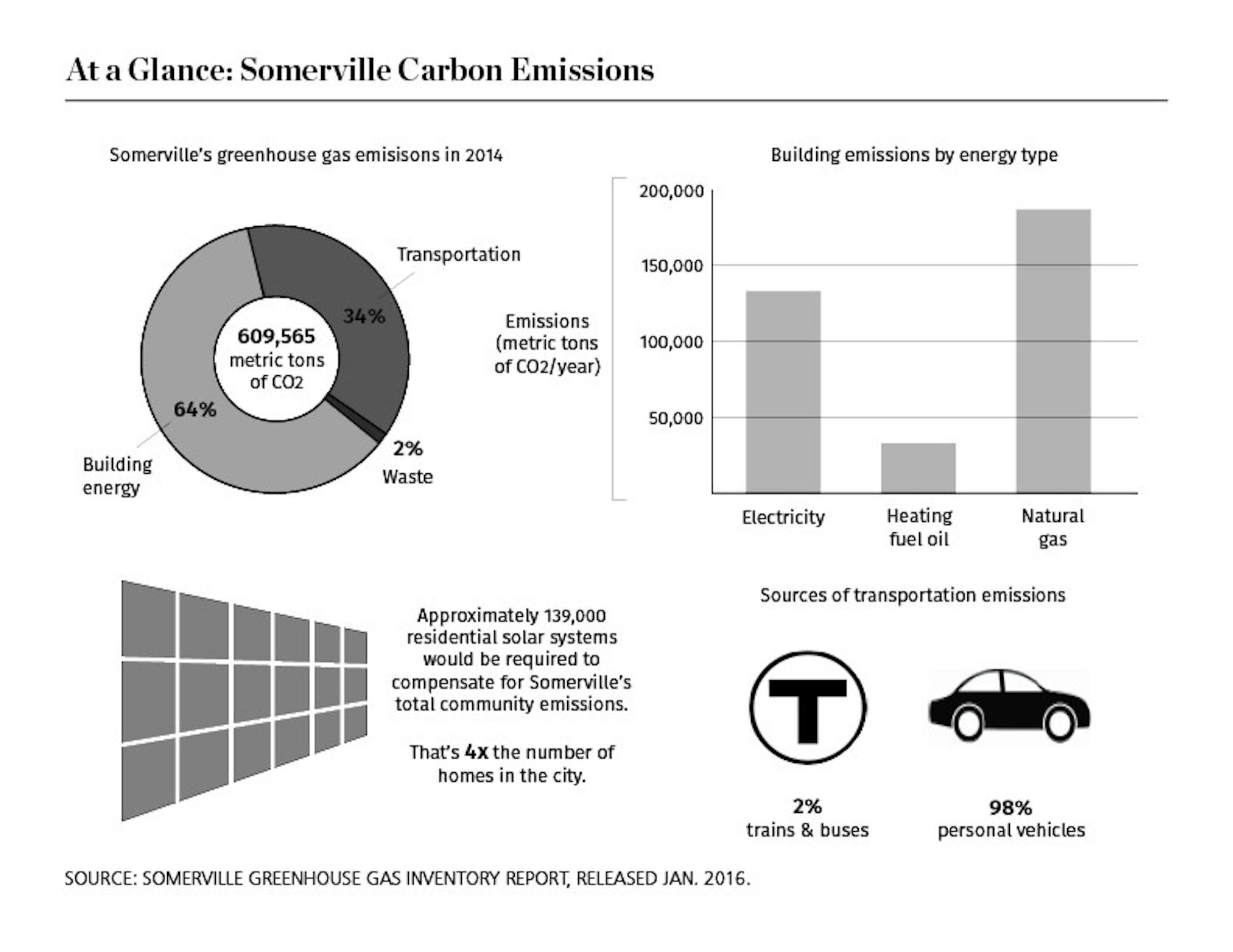The City of Somerville has been making progress on several of its initiatives to achieve its goal of becoming carbon-neutral by the year 2050 and has assessed which sectors and technologies could be used in the future to create policies that would reduce further environmental damage.
Somerville Director of Sustainability and Environment Oliver Sellers-Garcia described a number of key initiatives that have already been implemented to improve sustainability.
For example, the city has converted public streetlights from incandescent bulbs to LEDs, changed indoor lighting to fluorescent alternatives in public buildings and has begun to evaluate buildings to see how they could be consolidated or redesigned to be more fuel-efficient, according to Sellers-Garcia.
Furthermore, Somerville's environmental team has begun analyzing methods of de-carbonizing the main sources of emissions for the city, mostly through a greater focus on alternative and sustainable energy, according to Sellers-Garcia. However, not all energy sources can be easily converted, which is why Somerville has put forward policies that would reduce the use of transportation and construction within the city, Sellers-Garcia said.
In order to greatly cut back on expended energy, Somerville has begun a solar campaign in which local homeowners are encouraged to place solar panels on their houses to reduce the amount of energy consumed by individual homes, Sellers-Garcia said
At this time Tufts has no formal agreements with Somerville regarding these plans, according to Shoshana Blank, education and outreach program administration for the Tufts Office of Sustainability.
However, Blank was pleased with the university's efforts towards becoming carbon-neutral, noting that this spring, Tufts signed onto the Second Nature Climate Commitment. Blank said this agreement commits the university to creating a climate action plan to work towards carbon neutrality.
"Over 600 colleges and universities in the United States have signed onto this commitment, so Tufts is in good company," Blank told the Daily in an email.
Sellers-Garcia expressed interest in connecting Tufts to these new initiatives. Giving an example, Sellers-Garcia said both Harvard and MIT are required to abide by Cambridge environmental ordinances, especially those regarding building-by-building energy use on campuses.
At this time, both of these Cambridge-based institutions work jointly with their local government to advance climate change adaption planning, Sellers-Garcia said. Somerville is interested in doing the same with Tufts, Sellers-Garcia said, adding that the university does not seem to be doing its own form of climate adaptation.
However, the university does have its own climate initiatives, some of which have been in place for years, according to Blank.
For example, in 2013 Tufts made a goal to reduce energy consumption by five to seven percent every year for three years, with additional consumption reduction targets set for 2016, according to the Office of Sustainability's Commitments and Environmental Policies. This goal has been achieved each year, meaning new targets will be set in the future, according to the Commitments and Environmental Policies.
Furthermore, when University President Anthony Monaco took up his position in 2011, he made a point of having sustainability be a key focus in his administration, beginning by creating the Campus Sustainability Council in 2012, according to the Office of Sustainability's website.
"This academic year, we are working to create that climate action plan, using our existing Campus Sustainability Council Report from May 2013 as a starting point," Blank said.
The Campus Sustainability Council's policies and initiatives mirror those of Somerville at times by setting goals for reductions in energy use. However, according to Sustainability Tracking, Assessment & Rating System (STARS)'s evaluation of Tufts for 2015, Tufts scored 1.68 points out of a possible six on energy consumption, meaning total building energy consumption had increased.
In the renewable energy category of Tufts' STARS evaluation, zero of a possible four points were attained. However, this does not mean that renewable energy sources are not being used, as multiple sites on campus make use of solar panels in order to generate electricity, according to the report.
Tufts achieved a silver rating the year of evaluation and overall, Tufts ranks similarly to schools such as Boston University and Williams College, according to the report.
Somerville initiatives advance carbon-neutral goals






